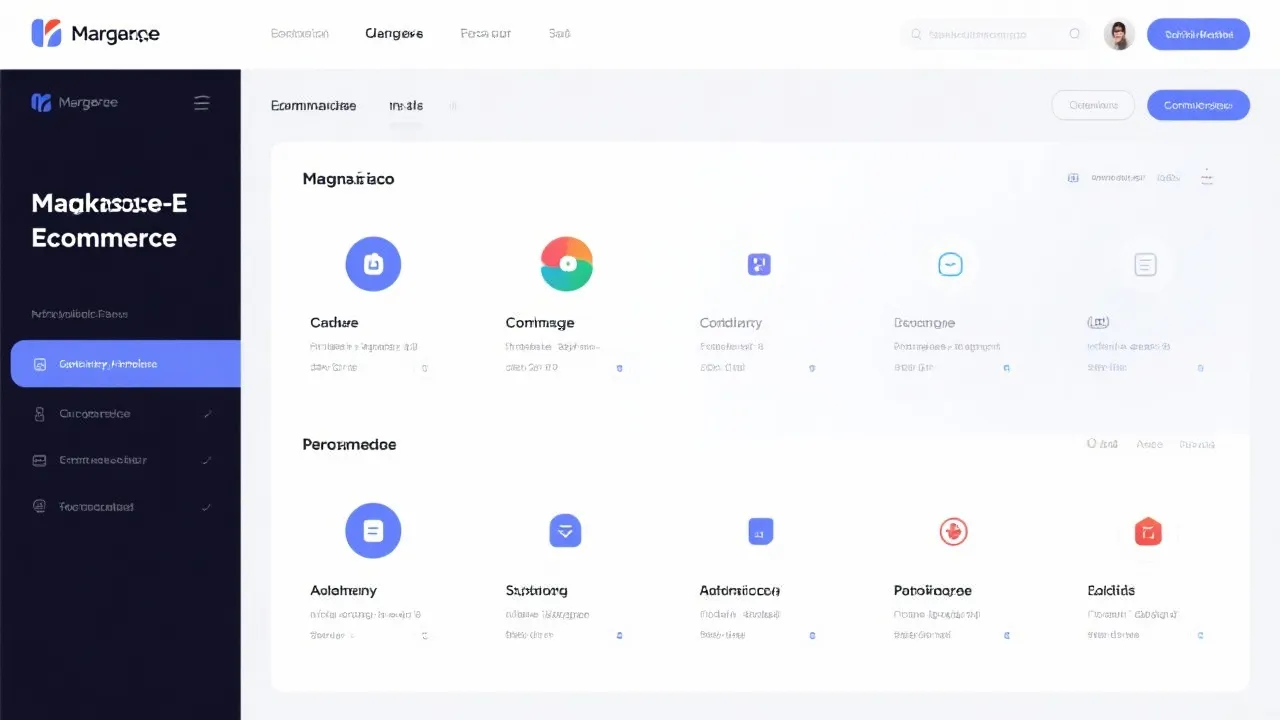Understanding Magento's Unique Features
This article delves into the functionalities and advantages of using Magento for your e-commerce platform, emphasizing its flexibility and adaptability. Magento is a leading e-commerce platform renowned for its robust features and customizable options, widely preferred by online retailers. The platform supports businesses by providing scalable solutions to enhance online operations, offering a rich set of functionalities to meet the diverse needs of enterprises seeking to improve their digital presence.

Introducing Magento: A Leading E-commerce Platform
Magento stands out as a preeminent e-commerce platform, favored by many brands for its robust, scalable, and customizable solutions. Designed to address the diverse needs of online businesses, Magento offers an extensive range of functionalities that allow companies to effectively manage and enhance their e-commerce operations. Its capacity to accommodate both small enterprises and large corporations makes it a popular choice in the digital marketplace. Magento has evolved significantly since its inception, driven by the need for businesses to provide unique shopping experiences and adapt to rapidly changing consumer behaviors. This platform serves as a cornerstone for many high-traffic online stores, empowering businesses to drive sales while nurturing customer relationships.
Key Features of Magento
Magento offers a plethora of features that set it apart from other platforms. These include:
- Flexibility and Customization: Magento allows merchants to tailor their online stores to match specific business requirements, offering a high degree of customization in terms of themes, plugins, and extensions. This flexibility means that businesses can create a unique brand identity and customer experience that stands out in a crowded market.
- Scalability: Whether you are running a small business or a large-scale corporation, Magento can scale with your company's growth, ensuring that your platform remains efficient and responsive as demand increases. This adaptability is crucial for businesses anticipating growth or seasonal spikes in traffic and sales.
- SEO Capabilities: Magento's SEO optimization tools help businesses improve their search engine rankings, driving more traffic to their sites. Comprehensive SEO features, such as URL structure customization, meta tags, and sitemaps, allow businesses to enhance their visibility and attract organic traffic.
- Mobile-Friendly Themes: With mobile commerce on the rise, Magento's responsive themes ensure that your store is accessible and appealing on all devices. The importance of mobile-friendliness cannot be overstated, as a significant portion of online shopping is conducted via smartphones and tablets.
- Advanced Security Features: Security is a prime concern for online businesses, and Magento offers robust security measures to protect customer data and prevent breaches. Regular security patches, a two-factor authentication option, and secure payment gateways contribute to a fortress-like security environment.
- Integrated Analytics and Reporting: Magento provides built-in reporting tools and analytics features that give businesses critical insights into their operations. Merchants can track sales, customer behavior, and product performance, allowing for informed decision-making and strategy adjustments.
Benefits of Using Magento
Choosing Magento can offer several advantages to businesses aiming for digital growth:
- Comprehensive Product Management: Magento's system allows detailed product categorization and management, making it easier for businesses to handle large inventories. Merchants can easily add, edit, and organize products in a user-friendly environment, complete with customizable product attributes.
- Multi-store Management: With Magento, businesses can manage multiple stores from a single backend, simplifying operations for brands with various online presences. This feature allows centralized control over disparate storefronts, enabling businesses to target different markets while maintaining operational efficiency.
- Responsive and Engaging Shopping Experience: The platform ensures a seamless and engaging shopping experience that encourages customer retention and boosts conversion rates. From intuitive navigation to personalized product recommendations, Magento enables an enjoyable customer journey, significantly impacting sales outcomes.
- Community and Support: Magento boasts a large community of developers and users who actively contribute to forums, sharing knowledge and troubleshooting issues. This community support, paired with extensive documentation and training resources, helps businesses navigate challenges and maximize the platform's potential.
- Third-Party Extension Marketplace: Magento has a vast marketplace for extensions and plugins, allowing businesses to enhance their store's functionality easily. From payment gateways to shipping solutions and inventory management tools, integrating these extensions can streamline operations and improve customer service.
Magento's Market Position
Magento has carved a strong position in the market due to its offering of both community-driven options and enterprise-level solutions. Many renowned global brands trust Magento for their e-commerce needs, benefiting from its prowess in delivering high-functioning and customer-friendly sites. Major brands such as Coca-Cola, Ford, and Nike have utilized Magento's capabilities to create dynamic online shopping experiences that cater to their audiences' diverse needs. This credibility established Magento as a leading e-commerce solution provider, consistently ranking among the top choices for robust e-commerce platforms.
Considerations for Implementing Magento
When implementing Magento, companies should consider several factors to optimize their experience:
- Technical Expertise: Implementing Magento may require technical expertise, as its full potential is realized through customized configurations. Businesses may need to hire skilled developers and designers familiar with Magento's unique architecture to harness the platform's extensive capabilities effectively.
- Cost Factors: While the initial investment is a consideration, the long-term benefits and scalability of Magento often justify the investment for many businesses. Highly customizable and capable of supporting large-scale operations, Magento may require significant upfront costs, but these costs can lead to substantial returns through enhanced sales and operational efficiency.
- Hosting Environment: Choosing the right hosting environment is crucial for ensuring the speed and security of your Magento site. Managed Magento hosting services can provide specialized support and optimized server configurations to maximize performance and minimize downtime.
- Maintenance and Updates: Ongoing maintenance is essential to keep your Magento site secure and functioning optimally. Regular updates are released to address security vulnerabilities, and businesses must stay proactive about applying these updates to safeguard their operations.
FAQs
- Is Magento suitable for small businesses?
Yes, Magento is scalable and offers solutions tailored to the needs of small, medium, and large enterprises. Its flexibility means small businesses can start with a basic configuration and grow their functionalities as needed. - Can Magento integrate with third-party services?
Absolutely, Magento supports numerous integrations with third-party services to enhance functionality and expand capabilities. Whether it's CRM software, email marketing tools, or inventory management systems, the ability to integrate provides a significant advantage. - How does Magento handle security?
Magento prioritizes security by providing regular updates and patches to protect against vulnerabilities. It also includes features like encrypted payment processing and a built-in security scanner to identify potential issues that could compromise a site's safety. - What payment options can be integrated with Magento?
Magento supports a wide range of payment gateways, including PayPal, Stripe, Authorize.net, and many more, which enables businesses to offer their customers multiple payment options. This flexibility can improve user experience and conversion rates. - Is it difficult to migrate from another platform to Magento?
Migration to Magento can be complex and usually requires careful planning and adequate technical expertise. However, various tools and services can streamline the migration process, ensuring that data integrity is maintained, and disruptions are minimized.
Conclusion
Magento remains a top contender in the e-commerce platform market due to its versatility, robust features, and scalability. Businesses looking for a reliable solution that can adapt to their evolving needs will find Magento to be an exceptional choice. Its ability to support businesses of all sizes and adapt to changing market demands strengthens its strategic importance for companies seeking to establish a strong digital footprint. Whether you are seeking to expand or optimize your existing online presence, Magento offers the tools and flexibility required to achieve those goals effectively.
Future of Magento and E-commerce
The e-commerce landscape is continually evolving, and Magento is keeping pace with emerging trends and technologies. As online shopping becomes increasingly integrated with social commerce, artificial intelligence, and augmented reality, Magento is developing features to harness these technologies and provide users with advanced capabilities. These innovations include AI-driven product recommendations that personalize the shopping experience, enabling retailers to enhance engagement and increase sales likelihood.
Moreover, Magento is enhancing its support for emerging payment methods, including cryptocurrencies and digital wallets. As consumer preferences shift towards diverse payment options, facilitating these alternatives within Magento will enable brands to reach broader audiences and cater to niche markets.
In terms of omnichannel retailing, Magento is continually improving its capabilities to ensure a seamless customer journey across various touchpoints. This includes integrating online and offline sales processes, enabling businesses to offer consistent and engaging experiences whether customers are shopping in-store or online.
Getting the Most Out of Magento
To fully leverage the capabilities of Magento, businesses should implement a comprehensive strategy that prioritizes continual learning and adaptation. Engaging with the Magento community can provide valuable insights and best practices for optimizing the platform. Attending Magento conferences, webinars, and training sessions can help keep businesses updated on new features and enhancements, as well as trends impacting the e-commerce landscape.
Additionally, businesses should continuously test and analyze their data to refine their approaches. Utilizing Magento’s analytics features can provide significant insights into customer behavior, aiding in optimizing environments to suit consumer preferences better. By remaining proactive in identifying areas for improvement and growth, businesses can harness Magento’s full potential and stay competitive in the rapidly changing e-commerce market.
Success Stories: Brands Leveraging Magento
Many renowned brands have successfully leveraged Magento to transform their e-commerce operations. For instance, the furniture retailer Guitar Center utilizes Magento to manage a robust online catalog and cater to the needs of both musicians and audio producers. Its effective use of Magento’s multi-store feature allows it to manage various storefronts catering to different types of products, ensuring customers have easy access to the items they need.
Another notable example is Helly Hansen, an outdoor clothing brand that efficiently manages its global business through Magento. The brand's customizable features and capabilities have allowed it to create localized experiences for its international markets, ensuring that users receive relevant content based on their geographic location.
Additionally, the athletic giant Nike has employed Magento to enhance its direct-to-consumer strategy. By taking control over its retail environment, Nike has generated direct engagement with consumers while gaining invaluable insights that drive future product development and marketing strategies.
Implementation Strategies for a Successful Magento Store
Implementing Magento requires careful planning and execution to ensure success. Here are several strategies to consider:
- Define Clear Objectives: Before embarking on building an online store with Magento, it's critical to determine specific business objectives. Understand what you intend to achieve, such as growing your customer base, improving conversion rates, or enhancing customer engagement. Setting clear goals helps streamline the development process and provides a benchmark against which success can be measured.
- Conduct Market Research: Understanding your target audience, their expectations, and market trends can guide critical decisions about Magento design and functionality. By conducting thorough market research, businesses can identify gaps in the current market and create tailored strategies to meet customer needs.
- Utilize Magento’s Modular Architecture: Magento's modular architecture allows businesses to add or remove features as needed easily. By adopting this modular approach, companies can avoid overwhelming their customers with unnecessary features while focusing on delivering the most wanted functionalities.
- Optimize User Experience: Investing time to create an intuitive and user-friendly storefront will yield higher engagement and conversion rates. Focus on usability by simplifying navigation, ensuring fast load times, and creating appealing product descriptions.
- Continuous Testing and Improvement: After launching the store, continuous testing should be performed to identify areas needing improvement. A/B testing various aspects of the store—such as product pages, checkout processes, and email campaigns—will reveal which changes lead to better user experiences and conversions.
Conclusion
Magento stands as a powerful contender in the e-commerce platform space, equipped with the features and flexibility essential for businesses striving to flourish in the digital age. As online shopping continues to evolve, e-commerce brands that harness the capabilities of Magento will better position themselves to meet consumer expectations. By focusing on building an engaging online environment, leveraging the range of capabilities available within the platform, and being responsive to market trends, businesses can drive significant success through their online operations.
-

A Guide to Cost-Efficient Small Electric Cars for Seniors
-

Mastering Debt Consolidation: Boost Your Credit Score and Manage Interest Rates
-

Your Guide to Loans, Credit Checks, and Interest Rates
-

Affordable Independent Living: Finding the Right Senior Housing
-

Guide to Senior Living Apartments: Affordable and Comfortable Environments










